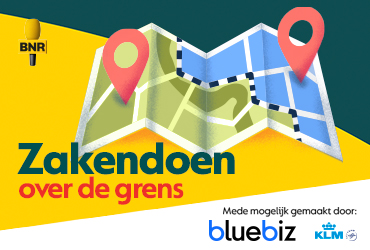Doing business in the USA: success begins by opening your wallet
 America is the land of unbridled opportunity. It’s hardly surprising that many entrepreneurs make their way across the ocean in the hope of building their businesses. Those who succeed gain access to a market of 330 million potential customers. But how exactly do you make your mark in this land of opportunity?
America is the land of unbridled opportunity. It’s hardly surprising that many entrepreneurs make their way across the ocean in the hope of building their businesses. Those who succeed gain access to a market of 330 million potential customers. But how exactly do you make your mark in this land of opportunity?
If anyone knows how to succeed in the United States, it’s Jacob Willemsen, founder and owner of Tabs Inc in New York. A company that employs around 35 people at branches in the US and Europe, advising entrepreneurs planning to set up shop in the US. According to Willemsen, it’s possible to succeed with any kind of business, in any sector. “We serve around 375 Dutch companies, whose products range from doggie treats to cybersecurity. But specific markets are currently looking particularly strong, with lots of doors opening in the climate and environmental technology industry, which is now being extensively subsidised by the American government. There’s also a growing interest in the US from Dutch and European med-tech and biotech businesses, which are facing ever-stricter European regulations for clinical trials, making the US increasingly attractive.”
Employ specialists
Production and manufacturing is also being heavily subsidised by the Biden government, as are foods and agriculture. “Dutch agricultural innovation is one example. How do you get the most out of one hectare of soil?” says Rob Derikx, who is with Rabobank in New York, where he heads six international desks, spread across various continents. With his New York team, Derikx serves small and medium-sized businesses with international growth ambitions, hoping to make moves in North America.
“It isn’t easy to get a foot in the door in the US,” says Derikx, cutting straight to the quick. “More than half of all companies give up here within three years.” Often these companies underestimate what’s required, particularly the costs involved, because the US is expensive and the regulations are complex, mainly because they differ from state to state.
“That’s why it’s important to hire the right specialists, even if they cost 400 dollars an hour,” says Derikx, who advises customers to ensure that they have enough capital to weather the first year. “That gives you sufficient margin to absorb setbacks. For instance, if you’ve recruited someone, who leaves after only a short time, this means you have to recruit again.”
“Company founders mustn’t think they can get away with just four flights to the US.”
Jacob Willemsen, founder and owner of Tabs Inc
The deepest pockets
Willemsen also sees that many Dutch entrepreneurs are hampered by their thrifty nature. When it comes to paying commission to a local agent or salesperson selling the company’s product in the US, for instance, he feels they need to set their thriftiness aside. “A CEO earning 200K in the Netherlands should be glad if their American salesperson earns 500K in commission, because that means they’re earning vast amounts of money for the company.”
In short, money plays a major role, which is why companies with the deepest pockets have the biggest chance of succeeding. But money certainly isn’t the only success factor. Commitment is also important and that means being there. Willemsen: “It takes a lot of time, patience and attention to build a team in the US. Company founders mustn’t think they can get away with just four flights to the US.” His advice is to have one of the founders on site permanently or to ensure monthly visits from a management executive.
“Americans are very good at selling themselves. So they expect the same from others.”
Rob Derikx, head of the International Desk North America at Rabobank Wholesale Banking
No modesty
It goes without saying that it’s important to present a company and its products and services in the best possible way. Have your elevator pitch polished and ready. This not only applies to products and services, but to the story behind them as well. “People buy coffee based on more considerations than its taste alone,” says Derikx. “They do so because George Clooney is in the commercial.”
Dutch people would benefit from setting aside their modesty. “In the Netherlands, it’s a virtue if you list your weaknesses as well as your strengths,” says Willemsen. “It gives you more credibility. But it doesn’t work like that in America, because Americans are the biggest, the best and the fastest.” Derikx shares the same experience. “Americans are very good at selling themselves. They’re taught to do so as children and they expect the same from others, if they are to believe in them.”
“The Dutch have earned a good name for themselves in the US. We’re reliable, honour our agreements and deliver quality.”
Jacob Willemsen, founder and owner of Tabs Inc
Consulting with New York
Despite cultural differences, Dutch companies do surprisingly well in winning assignments in the American market, Derikx observes. “The Dutch have earned a good name for themselves in the US. We’re reliable, honour our agreements and deliver quality. An added advantage is that Americans are always on the lookout for new opportunities,” says Willemsen. “Products from Europe have an exotic air about them, they’re interesting. The downside is that most Americans aren’t particularly loyal. If a better opportunity presents itself, they’re off.”
Both Willemsen and Derikx recommend beginning in a single state with a business venture in the US, preferably the North East. That’s “only” a seven- or eight-hour flight from the Netherlands and there’s a six-hour time difference. This has practical advantages, because you can consult with colleagues in New York, for example, when it’s midday in the Netherlands. Derikx: “There’s a nine-hour time difference with California, so it’s evening in the Netherlands when their workday begins. Are you prepared to give up your evenings in the Netherlands?”
Fifty countries
Another reason for starting in one state first is that it’s manageable in terms of distances, legislation, and culture. Willemsen: “The state of Texas is 17 times the size of the Netherlands.” Because the laws differ from state to state, it costs companies a huge amount of time and money (read: consultants!) to get to grips with everything. “You can’t simply conquer the US as a whole,” says Willemsen. “You shouldn’t see the US as a single country, but as 50 separate countries, each with its own rules and customs. You wouldn’t take on Europe all at once, you’d do it step by step.”
Once companies have gained a foothold in one state and have gained a certain amount of traction, they can venture out and expand operations in other states. “This is when you capitalise on the flywheel effect,” says Derikx. “Once you’re there and have established your product in the market, you’ll have won the confidence of the American people and things can move really fast from there. As they say in the US: think big, anything is possible.”
There are four things you must absolutely avoid when doing business with Americans:
- Don’t talk politics. Politics is a very touchy subject there and Americans will invariably try to persuade you of their views. Don’t get involved.
- Don’t underestimate what an impact the #MeToo movement has in the US. Things that people still laugh at in the Netherlands can land you in court there.
- Don’t cling stubbornly to Dutch habits. For example, Americans often pay for goods and services by writing cheques, even for seven-digit sums. Sure, it’s impractical, but go along with it, because you might lose orders otherwise.
- Don’t be afraid to negotiate contracts, especially if they were drawn up by Americans. There’s always leeway.
“Americans are astonished when we deliver a project on time”
Maik Voorwinden and his brother are the owners of Voorwinden Group, a greenhouse construction firm, which they took over from their father in 2017. The firm, with offices in Bleiswijk, is active in the US and Canada and has opened a branch there, complete with machinery and employee housing.
“We started out in Canada, thanks to a Dutch acquaintance in the horticulture sector. We then gained a foothold in the United States. The Dutch are known for their punctuality. For us, a deal is a deal. That’s very different for Americans. So, they’re astonished when we deliver a greenhouse project by the agreed deadline or even ahead of schedule. We’re used to doing business there now, but we struggled at first. I once went to a dealer to buy five vans and I thought I’d try to negotiate the price down, because that’s what we do in the Netherlands. The salesperson looked at me like I was nuts. ‘Take it or leave it,’ he said. There’s no haggling over prices there.”
Bluebiz
“Because we fly so much, we joined bluebiz about ten years ago. We use the blue credits we earn to purchase tickets, which makes a big difference. Bluebiz’s flexibility is also very convenient. We do book return tickets to the Netherlands, but because we never know precisely when a project will be finished, we need to be able to change the tickets without too much fuss. Our travel agent does that, by the way. We fly so often that it wouldn’t be feasible to arrange it all ourselves.”
“I spend about one week of every month in the US. I depart on Monday morning and, thanks to the time difference, arrive at the project site at around lunchtime. I fly back again on Thursday evening. I take a night flight, so I can sleep. Sometimes I use my Flying Blue Miles to upgrade to Business Class and then I sleep very soundly indeed. I land at Schiphol on Friday morning and head straight to the office, to work.”
Five bluebiz benefits for business flyers
If you’re a frequent business flyer, join bluebiz and enjoy all sorts of benefits:
- Earn and save: earn blue credits every time you book with KLM, Air France, Delta Air Lines and China Eastern and save on ticket purchases or spend the credits on extra comfort on board;
- Sustainability: blue credits can also be used to contribute to reforestation projects.
- Priority: Priority and Business Class passengers board first, followed by bluebiz passengers. In the event of flight disruptions, bluebiz members also have priority when it comes to rebooking;
- Flexibility: bluebiz members can change the name on a ticket free of charge;
- Recognition: business travellers with bluebiz bookings are easily recognisable and acknowledged by staff at the airport and on board the flight.
For more information, read about the benefits of bluebiz.

